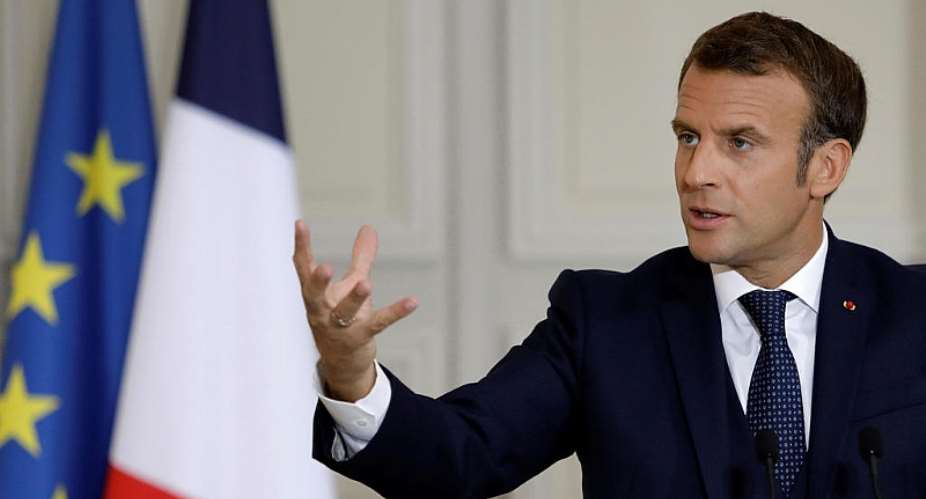French President Emmanuel Macron has expressed his disappointment after Lebanon's leaders failed to form a new government in the wake of the Beirut port blast last month. The political and economic crisis deepened after the prime minister designate stepped down on Saturday.
Speaking on Sunday at a press conference, French President Emmanuel Macron declared he was "ashamed" of Lebanon's political leaders and described their lack of progress on forming a new government a "collective betrayal".
"I see that the Lebanese authorities and political forces chose to favour their partisan and individual interests to the detriment of the general interest of the country," he said.
This comes after Prime minister-designate Mustapha Adib's resigned on Saturday, ending efforts to form a reformist government.
The previous Lebanese government had resigned amid widespread anger over the explosion in Beirut on 4 August that killed 190 people, injured thousands and damaged large parts of the capital.
Lebanon's former ambassador to Germany, Adib, who had Macron's full support, was nominated to lead on 31 August.
In early September, during a visit to Lebanon by Macron, political parties had pledged, to form within two weeks a cabinet of independent ministers tasked with rehabilitating the country's economy.
Macron has visited the former French protectorate twice since the blast, meeting Hezbollah representatives during his last trip as he sought to bring all political sides behind a roadmap to lift the country out of crisis.
In August, he chaired a video conference that saw world leaders pledge more than 250 million euros ($295 million) for the country.
Macron said none of the leaders of Lebanon -- where in the wake of the 1975-1990 civil war power is traditionally shared between Shiites, Sunnis and Christians -- had been up to the task.
"All of them bet on the worst case scenario for the sake of saving themselves, the interests of their family or their clan," he said.
Conflict over finance portfolio
"I therefore have decided to take note of this collective betrayal and the refusal of Lebanese officials to engage in good faith."
Under the Lebanese constitution, the president must now hold further talks to nominate another prime minister to form a government, but it is a process that risks dragging out and even failing.
Adib's efforts were hampered by the claims of two Shiite formations, the Iran-backed Hezbollah movement, and its ally Amal, led by parliament speaker Nabih Berri, who demanded the finance portfolio.
According to observers, the Shiite allies dug in their heels after recent US sanctions were imposed on a minister of the Amal party and two companies affiliated with Hezbollah.
In a warning to Hezbollah, Macron said the group "must show that it respects all the Lebanese -- and in recent days, it has clearly shown the opposite."
Call for credible commitments
The Beirut port blast served to amplify a crisis which had been rumbling along for decades.
Anti-government demonstrators have staged mass rallies over the past year, calling for a complete overhaul of the political system.
After Lebanon defaulted for the first time on its sovereign debt in March, it turned to the International Monetary Fund, but those talks soon stalled.
Macron also said that he would consider withholding financial aid or imposing sanctions on the ruling elite if there were no real change within the next three months.
He called for credible commitments from party leaders, including a timetable for implementing reforms and parliamentary elections within six to 12 months.





 We’ll no longer tolerate your empty, unwarranted attacks – TUC blasts Prof Adei
We’ll no longer tolerate your empty, unwarranted attacks – TUC blasts Prof Adei
 Bawumia donates GHc200,000 to support Madina fire victims
Bawumia donates GHc200,000 to support Madina fire victims
 IMF to disburse US$360million third tranche to Ghana without creditors MoU
IMF to disburse US$360million third tranche to Ghana without creditors MoU
 Truck owner share insights into train collision incident
Truck owner share insights into train collision incident
 Paramount chief of Bassare Traditional Area passes on
Paramount chief of Bassare Traditional Area passes on
 Two teachers in court over alleged illegal possession of BECE papers
Two teachers in court over alleged illegal possession of BECE papers
 Sunyani: Victim allegedly shot by traditional warriors appeals for justice
Sunyani: Victim allegedly shot by traditional warriors appeals for justice
 Mahama vows to scrap teacher licensure exams, review Free SHS policy
Mahama vows to scrap teacher licensure exams, review Free SHS policy
 Government will replace burnt Madina shops with a new three-story, 120-store fac...
Government will replace burnt Madina shops with a new three-story, 120-store fac...
